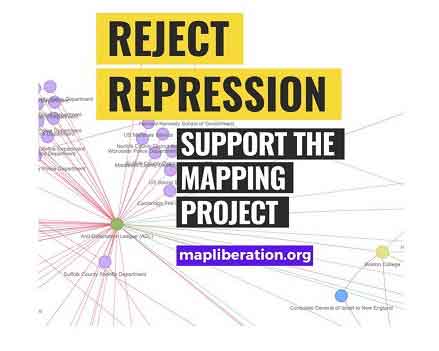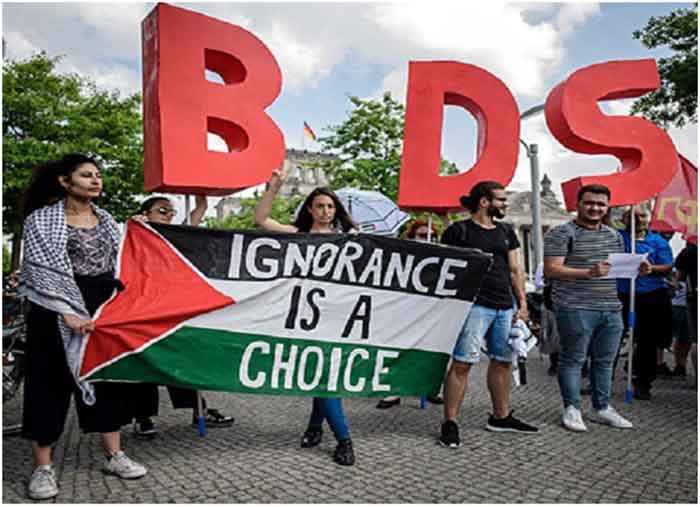“We affirm our support for the Mapping Project out of Boston, and condemn attempts to censor this useful educational tool.”
The above expression of solidarity with an independent anonymous collective based in Boston that takes an innovative, well-researched approach to highlighting the connections between Zionist organizations and institutions is unremarkable — until you discover who is attempting to disassociate itself from it for fear of consequences related to the vilification, mis-characterization and criminalization of this project by the ADL and other Zionist organizations.
Rather than standing up to predictable Zionist attacks and deflections, Palestinian BDS National Committee (BNC) issued a statement disavowing the Mapping Project and those, like BDS Boston, who expressed solidarity with it. It’s not surprising that this statement on Twitter was met with vehement pushback.
What is surprising is the position or strategy the BNC has taken on liberation activism and resistance to oppression. It’s a position that has remained behind the scenes until now in order not to undermine the worldwide reach of BDS, a movement that has been successful on the world stage, especially in the last few years.
But the question must now be asked: What does the BNC think it is doing by taking a political position while at the same time insisting it has no political position and is simply a human rights movement focused on Israel’s violations of Palestinian rights and international Law?
If the BNC wishes to skirt certain issues for fear of legal warfare by Zionist organizations or withdrawal of support by liberal funders, that’s its prerogative. But why go out of its way to disavow Palestinian resistance, as it is doing with BDS Boston now, and as it has done with the Canadian BDS Coalition because of its refusal to exclude Samidoun: Palestinian Prisoner Solidarity Network?
Samidoun is a political prisoner support organization that includes support for long-term political prisoners, i.e., those who are jailed because they engage in armed resistance, regarding them as the leadership of the Palestinian liberation struggle who give the organization legitimacy, rather than the other way around.
The BNC’s position is that it “must protect the movement … [by] being efficient, strategic and principled. There are groups in the movement who aren’t doing that… We must remember European privilege and how it affects Palestinians.”
But whereas the BNC acknowledges the right of Palestinian resistance to advocate for armed resistance or engage in direct action, it goes on to say “they have the right to do so, but without any association with BDS. We do not have any relationship with them accordingly, and we urge all BDS groups not to organize anything with them.”
Acting on principle means “acting with integrity and honesty, with a strong sense of fairness, justice and respect for the dignity of the individual, groups and communities.” Samidoun and Palestine Action (which the BNC also condemns as “unprincipled”) act on very strong principles. What’s more, the latter is beginning to achieve notable successes battling the Israeli arms firm Elbit Systems and has now shut down two Elbit installations in Britain. It’s as a matter of principle that the Canadian BDS Coalition rejected BNC’s demands to disavow Samidoun.
Let’s face it; by standing against Palestinian resistance instead of with it, the BNC itself is making unprincipled political demands. The Palestinian liberation movement is bigger than BNC (and predates it) and the struggle for Palestinian liberation does, of course, include BDS work. Many people are unaware that the call to boycott Israel did not begin in 2005. As a friend explains:
Not only have Arabs and Palestinians been boycotting Israel for decades, but it has been a call in the international movement as well and you can see campaign materials in English, Dutch, German, French calling for boycott in the 1970s and 1980s. I say this to say that the 2005 BDS call is a call to action, a call to the world. The development of the structure of a “National Committee” [BNC] atop that that has given itself the authority to engage in these kinds of political decisions is something that requires serious thought, especially when the role it is playing is not to call out corporations and institutions and artists violating the boycott or to mobilize actions, but instead to engage in political pressure inside the movement.
The Palestinian BDS National Committee (BNC) describes itself as “the broadest Palestinian civil society coalition that works to lead and support the BDS movement for Palestinian rights.” It’s time to understand, though, that the BNC is not as broad (or broad-minded) as it thinks it is, after all. As Sabyasachi Biswal wrote last year,
[Despite BDS putting] a huge onus on the Jewish state to defend its Zionist ideologies in-front of a critical world, which has seen the state’s multiple international law violations since the 2014-Gaza siege… it [BDS] hasn’t found much credible backing in the non-intellectual civil society and is continuously, and intentionally miscued by the Israeli and American political class to delegitimise the movement.

Reject Repression: Support the Mapping Project
We must all reject “any attempts to prevent organizers from confronting the interconnectedness of systems of oppression. No one in our movement has a monopoly on movement tactics, including BDS. The work to uncover the relationships between policing, Zionism, and imperialism is critical movement work that should be uplifted.”
We must reject all repression on principle, even that coming from BNC.
For those interested in learning more about the Mapping Project, I suggest reading informative interviews with the collective published by Mondoweiss and Samidoun and a commentary/analysis by Omar Zahzah titled ‘Connecting the Dots: The Liberationist Ethos of the Mapping Project.’
Note: First published on Medium
________________________
Rima Najjar is a Palestinian whose father’s side of the family comes from the forcibly depopulated village of Lifta on the western outskirts of Jerusalem and whose mother’s side of the family is from Ijzim, south of Haifa. She is an activist, researcher and retired professor of English literature, Al-Quds University, occupied West Bank.











































